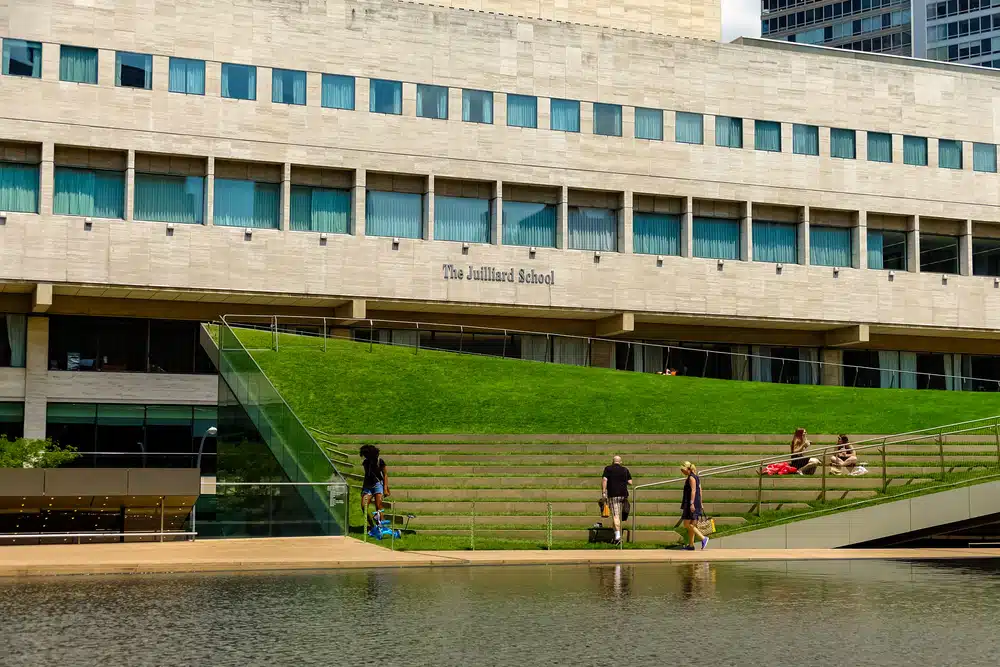The Best Music Colleges in the World
In today’s globalized society, pursuing quality education has become increasingly important. For aspiring musicians and music enthusiasts, finding the best music colleges is crucial to their development and success. Music education provides a solid foundation for aspiring musicians, allowing them to hone their skills and nurture their creativity.
Understanding the Importance of Music Education
Music education plays a vital role in personal development. It provides individuals with a creative outlet, allowing them to express themselves and explore their emotions through the power of sound. From a young age, music education nurtures discipline, perseverance, and dedication, teaching students the value of hard work and practice.
Moreover, music education goes beyond the realm of personal growth and has a significant impact on society as a whole. When students engage in music education, they develop a sense of teamwork and collaboration.
They learn to work together harmoniously, listening to each other’s melodies and harmonies and creating a unified piece of art. This collaboration extends beyond the music classroom and prepares students for future endeavors, whether in the professional world or personal relationships.
Furthermore, music education has a profound impact on cognitive skills. Numerous studies have shown that learning music enhances memory, improves spatial-temporal skills, and boosts problem-solving abilities. It stimulates brain development and enhances overall cognitive function, making it an essential component of a comprehensive education.
Criteria for Selecting the Best Music Colleges
Aspiring musicians must carefully consider various factors when selecting a music college. Firstly, they should assess the faculty’s expertise and experience. World-class music colleges boast a faculty composed of experienced musicians, composers, conductors, and educators who can provide invaluable guidance and mentorship.
When it comes to faculty expertise, it’s not just about their impressive resumes. It’s also about their ability to connect with students on a personal level, fostering a supportive and nurturing environment. The best music colleges understand that mentorship goes beyond technical instruction; it involves cultivating a passion for music and instilling a sense of artistic identity in each student.
Furthermore, faculty members actively engaged in the music industry can offer students unique insights into the current trends and demands of the field. They can provide valuable networking opportunities and help students navigate the ever-evolving landscape of the music industry.
The course quality and curriculum is also a crucial factor to consider. The best music colleges offer comprehensive programs encompass theory, technique, performance, and music history. A well-rounded curriculum enhances students’ knowledge and skills, equipping them with a solid foundation for future endeavors.
However, an excellent curriculum goes beyond the basics. It should also include specialized courses that cater to different musical genres and styles. Whether a student is interested in classical, jazz, pop, or world music, a diverse curriculum that embraces various musical traditions can broaden their horizons and nurture their artistic versatility.
Top Music Colleges in North America
North America is home to several renowned music colleges that offer exceptional educational opportunities. These institutions have a long-standing reputation for excellence and produce numerous successful graduates.
Notable institutions in North America include The Juilliard School, Berklee College of Music, and Curtis Institute of Music. Each of these colleges has unique features and strengths, attracting students from all over the world. Whether it’s classical, jazz, or contemporary music, these institutions excel in providing specialized training and fostering artistic growth.
The Juilliard School, located in New York City, is widely regarded as one of the most prestigious music schools in the world. Founded in 1905, it has a rich history of nurturing exceptional talent and pushing the boundaries of musical expression. The school offers programs in classical music, jazz, and dance, providing students with a well-rounded education in the performing arts.
Berklee College of Music, located in Boston, Massachusetts, is renowned for its contemporary music programs. With a focus on jazz, rock, pop, and electronic music, Berklee attracts aspiring musicians passionate about pushing traditional genres’ boundaries. The college’s innovative curriculum and state-of-the-art facilities give students the tools they need to succeed in the ever-evolving music industry.
Curtis Institute of Music, located in Philadelphia, Pennsylvania, is known for its rigorous training programs in classical music. Founded in 1924, Curtis has a long history of producing world-class musicians with successful careers in renowned orchestras and ensembles. The institute’s small size allows for personalized attention and mentorship, ensuring that each student receives the highest level of musical education.
In addition to these top institutions, North America is home to a vibrant and diverse music scene. Major cities like Los Angeles, Nashville, and Toronto are known for their thriving music industries, providing students with ample opportunities to network and collaborate with professionals in the field. Whether it’s performing at iconic venues, recording in state-of-the-art studios, or attending music festivals, students in North America have access to a wide range of experiences that enrich their musical journey.
Furthermore, these music colleges often host masterclasses, workshops, and guest lectures by renowned musicians, composers, and industry professionals. These events provide students with valuable insights and opportunities to learn from some of the most accomplished individuals in the music world.
Renowned Music Colleges in Europe
Europe has a rich musical heritage and is home to some of the world’s most prestigious music colleges. The European education system offers a unique approach to music education, emphasizing tradition, technique, and a deep appreciation for classical music.
One of the leading institutions in Europe is the Royal Academy of Music in London. Founded in 1822, it has a long-standing reputation for excellence in music education. The academy offers various programs, including classical performance, composition, and conducting. Students at the Royal Academy of Music benefit from the guidance of world-class faculty members who are renowned musicians in their own right. The academy’s emphasis on technical mastery and artistic expression prepares students for successful careers in the music industry.
Another renowned music college in Europe is the Conservatoire de Paris. Established in 1795, it is one of the world’s oldest and most prestigious music schools. The Conservatoire offers a comprehensive curriculum covering various musical disciplines, including classical, jazz, and contemporary music.
Students at the Conservatoire de Paris can learn from distinguished faculty members who are experts in their respective fields. The Conservatoire’s commitment to nurturing artistic talent and fostering creativity has produced many internationally acclaimed musicians.
In Germany, the Hochschule für Musik und Theater München is highly regarded for its exceptional music programs. Founded in 1846, it is one of the oldest music schools in Germany. The college offers diverse courses, including instrumental and vocal performance, music education, and musicology.
Students at the Hochschule für Musik und Theater München benefit from a supportive and collaborative learning environment where they can develop their technical skills and artistic vision. The college’s strong emphasis on practical training and performance opportunities equips students with the necessary tools to succeed in the competitive music industry.
These colleges prioritize technical solid foundations and encourage students to explore their creative voices. In addition to their rigorous academic programs, these institutions often host masterclasses, workshops, and concerts featuring renowned musicians worldwide. This provides students valuable opportunities to learn from and network with industry professionals.
Studying at one of these renowned European music colleges offers a world-class education and exposes students to diverse musical traditions and cultures. The vibrant and dynamic music scenes in cities like London, Paris, and Munich provide students with countless opportunities to engage with the local music community and gain practical experience.
Exploring Music Colleges in Asia and Australia
The evolving landscape of music education in Asia and Australia has garnered international recognition. In recent years, these regions have witnessed a surge in the number of music colleges and the quality of their programs.
A blend of traditional values and innovative practices characterizes the music education scene in Asia and Australia. Institutions such as the Shanghai Conservatory of Music in China, the Seoul National University College of Music in South Korea, and the Sydney Conservatorium of Music in Australia offer diverse musical experiences and opportunities for collaboration.
Asia and Australia’s music colleges celebrate their rich cultural heritage while embracing the global influences that shape contemporary music. They encourage students to explore various genres and experiment with new styles, fostering a dynamic and vibrant music community.
The Evolution of Music Education in Asia and Australia
The evolution of music education in Asia and Australia can be attributed to a growing recognition of the value of music in society. These regions have invested in expanding music education programs in schools and universities, nurturing young talents, and cultivating a passion for music.
Music colleges in Asia and Australia offer a wide range of specialized programs, allowing students to delve into composition, music production, ethnomusicology, and music therapy. This broad spectrum of offerings empowers students to pursue their unique musical interests and aspirations.
Prominent Music Colleges and Their Offerings
Asia and Australia boast several prominent music colleges, each with distinct offerings. The Beijing Central Conservatory of Music in China is renowned for its classical music programs. At the same time, the Tokyo College of Music in Japan is known for its emphasis on traditional Japanese music.
The Elder Conservatorium of Music at the University of Adelaide is highly regarded in Australia for its jazz and contemporary music programs. The Queensland Conservatorium Griffith University in Brisbane is acclaimed for its world-class recording facilities and comprehensive music curriculum.
With the rapid growth of the music industry in Asia and Australia, these music colleges have become hotbeds for talent and innovation, attracting students from around the globe who seek exceptional educational experiences.
How Do You Get Into a Top Music College?
The path ahead is as exhilarating as it is demanding. It’s not just about your ability to hit the high notes or master complex compositions; it’s about showcasing a well-rounded profile that screams potential. You’re not merely applying for a seat in a classroom; you’re auditioning for a role in a community that breeds musical legends.
To secure your spot, you’ll need to excel in several key areas: the audition, academic performance, your portfolio, and yes, even the often-dreaded letters of recommendation. Each of these elements serves as a movement in the symphony of your application, and when harmonized perfectly, they can open the doors to a world of unparalleled musical education.
The Audition: Your Moment to Shine
The audition is your crescendo, a defining moment where you can let your talent roar. This isn’t just another performance; it’s your statement set to melody and rhythm. You’ll need to choose pieces that demonstrate technical proficiency and reveal your artistic voice.
Remember, the best music colleges in the world are not just looking for musicians; they’re searching for storytellers, innovators, and future legends. So, when you step onto that stage, make sure you’re not just playing notes; you’re playing a narrative that only you can tell. Preparation is essential, so practice until your performance is as smooth as a Stradivarius violin.
Academic Requirements: GPA, Test Scores, and More
While your musical prowess takes center stage, don’t underestimate the role of academics. The best music colleges in the world seek students who are intellectually curious and academically rigorous. A strong GPA is often a prerequisite, but so are standardized test scores, particularly if you’re eyeing institutions in the United States.
Some colleges may also require subject tests or Advanced Placement (AP) scores, especially if you’re applying for a program that combines music with another discipline, like music technology or music therapy. Your academic record should sing harmoniously with your musical achievements, creating a profile that’s as balanced as a well-composed symphony.
Portfolios and Recommendations: Showcasing Your Talent
Your portfolio is your encore, a chance to leave a lasting impression long after the audition. This is where you can showcase compositions, arrangements, or any other projects demonstrating your versatility and depth as a musician.
Include a variety of styles and formats to show that you’re not a one-trick pony but a multifaceted artist. Letters of recommendation can serve as the backing vocals to your lead performance. Choose mentors or professionals who can speak to your musicality, dedication, and potential for growth. Their words can add weight to your application, turning it into a compelling narrative that resonates with admissions officers at the best music colleges in the world.
What Courses Can I Expect to Take?
The courses you’ll encounter are designed to mold you into a well-rounded musician capable of artistic expression and intellectual discourse. You’ll find a symphony of subjects that range from the foundational to the specialized.
Core courses in music theory lay the groundwork, while specialized tracks allow you to delve deep into your chosen field, be it composition, performance, or even music technology. But the learning doesn’t stop there.
Electives allow you to explore new genres and instruments, and masterclasses provide an invaluable learning experience from industry legends. Your academic life will be a rich tapestry of diverse musical threads woven together to create a musician of both skill and substance.
Core Music Theory: The Building Blocks of Sound
Core music theory courses serve as the cornerstone of your education. These building blocks will enable you to understand, analyze, and create music with depth and sophistication. You’ll dive into the intricacies of harmony, melody, rhythm, and form.
You’ll dissect iconic compositions to understand their genius and learn the language of music so fluently that you can articulate your ideas with clarity and conviction. The best music colleges in the world ensure that their students have a rock-solid foundation in theory, as it’s the lens through which you’ll view all other musical subjects.
Specialized Tracks: From Composition to Music Technology
Once you’ve mastered the basics, it’s time to specialize. Whether you’re an aspiring composer, a future recording engineer, or a performer waiting for the spotlight, specialized tracks offer a focused curriculum tailored to your career goals.
You could be orchestrating symphonies, producing electronic music, or studying the nuances of jazz improvisation. These tracks are designed to be immersive, hands-on experiences that equip you with the skills you’ll need in the professional world. The best music colleges in the world offer a plethora of specialized tracks, each a potential path to mastery and, ultimately, to a fulfilling career in music.
Electives: Expanding Your Musical Horizons
But what about the music that falls outside your chosen specialty? That’s where electives come in. These courses are your ticket to a broader musical world, allowing you to dabble in genres or instruments you’ve never tried.
Have you ever wondered what playing the sitar is like or how film scores are composed? Electives give you the freedom to explore these curiosities. They add complexity to your musical identity, making you a more versatile and adaptable artist. At the best music colleges in the world, the range of electives is as diverse as the student body, offering a global perspective on the world of music.
Masterclasses and Workshops: Learning from the Greats
Last but certainly not least, masterclasses and workshops offer the unparalleled opportunity to learn directly from industry legends and virtuosos. These are not mere lectures but interactive sessions where you can receive personalized feedback, ask questions, and even perform.
It’s like a private lesson with a musical icon, an experience that can provide insights no textbook ever could. These masterclasses are often exclusive to the best music colleges in the world, making them a unique selling point you won’t want to miss.
Ready to Hit the High Notes of Your Academic Journey?
You’ve just explored the ins and outs of the best music colleges in the world, from the rigorous admissions process to the enriching courses that await you. But we know that navigating this complex symphony of choices and challenges can be overwhelming. That’s where AdmissionSight comes in.
Why Go Solo When You Can Have a Maestro?
At AdmissionSight, we’re not just college admissions consultants; we’re your conductors guiding you through the intricate composition of the college admissions process. We offer tailored strategies that harmonize your academic achievements with your artistic talents, turning your application into a masterpiece that resonates with admissions officers.
What We Offer:
- Expert Guidance on Audition Preparation
- Personalized Academic Roadmaps
- Portfolio Reviews and Enhancement
- Exclusive Masterclasses on Crafting the Perfect Application
Don’t leave your future to improvisation. Let AdmissionSight fine-tune your path to one of the best music colleges in the world.









































